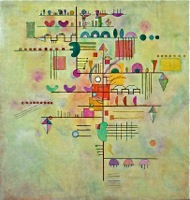Difference between revisions of "Computation"
| Line 1: | Line 1: | ||
[[Image:lighterstill.jpg]] | [[Image:lighterstill.jpg]] | ||
| − | [[Image: | + | [[Image:Biophysics_of_computation_version_2.jpg|right|frame]] |
| − | '''Computation''' is | + | ==Origin== |
| + | from French ''computer'' or [[Latin]] ''computare'', from ''com''- ‘[[together]]’ + ''putare'' ‘to settle (an account). | ||
| + | *[http://en.wikipedia.org/wiki/15th_century 15th Century] | ||
| + | ==Definitions== | ||
| + | *1a : the act or [[action]] of computing : [[calculation]] | ||
| + | :b : the use or operation of a [[computer]] | ||
| + | *2: a system of [[Accounting|reckoning]] | ||
| + | ==Description== | ||
| + | '''Computation''' is any type of calculation or use of computing [[technology]] in [http://en.wikipedia.org/wiki/Information_processing information processing]. Computation is a [[process]] following a well-defined [[model]] understood and [[expressed]] as, for example, an [[algorithm]], or a protocol. Computation can be [[classified]] by mainly three unique criteria: digital versus analog, sequential versus parallel versus concurrent, batch versus interactive. | ||
| − | + | In [[practice]], digital computation aids [[simulation]] of natural processes (for example, [http://en.wikipedia.org/wiki/Evolutionary_computation evolutionary computation]), including those that are naturally described by analog models of computation (for example, [http://en.wikipedia.org/wiki/Artificial_neural_network artificial neural network]). Otherwise, calculation is a term for the computation of [[numbers]], while computation is a wider reaching term for [[information]] processing in general.[http://en.wikipedia.org/wiki/Computation] | |
| − | |||
| − | |||
| − | |||
| − | |||
| − | |||
| − | |||
| − | |||
| − | |||
| − | |||
| − | |||
| − | |||
| − | |||
| − | |||
| − | |||
| − | |||
| − | |||
| − | |||
| − | |||
| − | |||
| − | |||
| − | |||
| − | |||
| − | |||
| − | |||
| − | |||
| − | |||
| − | |||
| − | |||
| − | |||
| − | |||
| − | |||
| − | |||
| − | |||
| − | |||
| − | |||
| − | |||
| − | |||
[[Category: Computer Science]] | [[Category: Computer Science]] | ||
Revision as of 17:37, 9 June 2014
Origin
from French computer or Latin computare, from com- ‘together’ + putare ‘to settle (an account).
Definitions
- 1a : the act or action of computing : calculation
- b : the use or operation of a computer
- 2: a system of reckoning
Description
Computation is any type of calculation or use of computing technology in information processing. Computation is a process following a well-defined model understood and expressed as, for example, an algorithm, or a protocol. Computation can be classified by mainly three unique criteria: digital versus analog, sequential versus parallel versus concurrent, batch versus interactive.
In practice, digital computation aids simulation of natural processes (for example, evolutionary computation), including those that are naturally described by analog models of computation (for example, artificial neural network). Otherwise, calculation is a term for the computation of numbers, while computation is a wider reaching term for information processing in general.[1]
